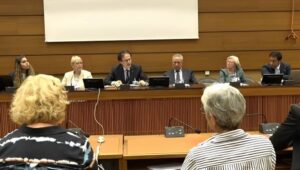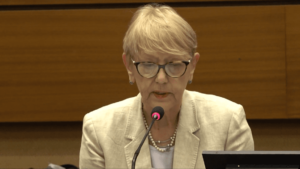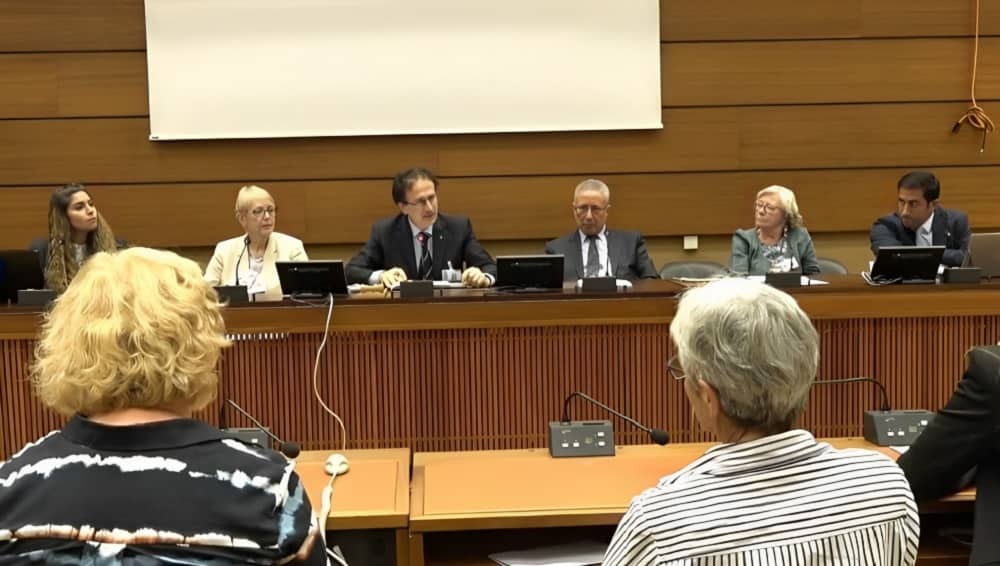Human rights experts at the 54th UN Human Rights Council session on October 3, 2023, called for renewing the UN Fact-Finding Mission’s mandate on Iran. They focused on the crackdown on women-led protests since September 2022 and urged an investigation into the 1988 massacre of political prisoners in Iran.
Speakers included Antonio Stango, President of the Italian Federation for Human Rights; Sonja Biserko, Former Member of the UN Commission of Inquiry on Human Rights Violations in North Korea and President of the Helsinki Committee for Human Rights in Serbia; Tahar Boumedra, JVMI Director and former Chief of UNAMI Human Rights Office; Laurence Fehlmann Rielle, Member of the National Council of Switzerland; Neda Amani, Representative of the Iranian Youth Association in Switzerland; and Hanif Asyabani, Iranian human rights activist.

This side event on Iran saw attendance from numerous Permanent Missions and NGOs. Antonio Stango expressed concern over Iran’s deteriorating human rights situation, highlighting a systematic crackdown on those seeking the truth about the 1988 massacre.
With extensive experience in monitoring global human rights violations, Mr. Stango emphasized his thorough observation of Iran’s human rights landscape over the years. He underscored the tumultuous events that unfolded in Iran during the past year, characterizing them as a series of protests often likened to a revolution.
Sonja Biserko stressed the issue of impunity in Iran, emphasizing the need for accountability for the 1988 extrajudicial executions. She highlighted Iran’s security forces’ unchecked actions and their impact on basic freedoms and human rights.
JVMI Director Tahar Boumedra informed the panel about Iranian authorities’ systematic crackdown on those seeking truth and justice regarding the 1988 massacre.
The conference aimed to address Iran’s human rights, especially under the clerical regime, advocating for an extension of the UN Fact-Finding Mission to investigate the suppression of women-led protests and calling for a probe into the 1988 political prisoner executions. #UNHumanRights #Iran #1988Massacre
The following is the text of Ms. Sonja Biserko’s remarks:
Geneva, Side Event, October 3, 2023
A Discussion on Human Rights Violations in Iran
Ladies and Gentlemen,
Dear Friends and the Families,
I am deeply honored to have been invited to participate in this crucial event focused on countering impunity in Iran. As highlighted in the Human Rights Report, the issue of impunity in Iran persists year after year, with security forces acting without accountability, repressing basic freedoms, and committing widespread abuses.
 One of the most tragic chapters in Iran’s recent history is the series of extrajudicial executions that occurred in 1988, resulting in the deaths of thousands of political prisoners in a matter of weeks. These victims were clandestinely buried in mass graves. Prominent international experts argue that these horrific crimes amount to both crimes against humanity and genocide. The Iranian government has faced extensive international scrutiny and condemnation for its role in these events.
One of the most tragic chapters in Iran’s recent history is the series of extrajudicial executions that occurred in 1988, resulting in the deaths of thousands of political prisoners in a matter of weeks. These victims were clandestinely buried in mass graves. Prominent international experts argue that these horrific crimes amount to both crimes against humanity and genocide. The Iranian government has faced extensive international scrutiny and condemnation for its role in these events.
Unfortunately, despite the international community’s attention, the perpetrators of these crimes, including Iran’s current President Ebrahim Raisi and Judiciary Chief Gholam-Hossein Mohseni Ejei, continue to enjoy impunity. This culture of impunity has led to a brutal crackdown on the “Women, Life, Freedom” protest movement over the past year, resulting in the alleged deaths of more than 750 protesters on the streets and numerous executions in prisons.
It is vital to emphasize that the protest movement has consistently called for accountability and justice. Their demands include the overthrow of Iran’s clerical regime and the pursuit of greater social and political freedoms. These nationwide protests represent the most significant challenge to the Islamic Republic in decades and are likely to resurface in the future.
To break the cycle of impunity, it is imperative that the UN Human Rights Council renew the mandate of the Fact-Finding Mission to investigate the regime’s crackdown on current protests.
UN Special Rapporteur on Iran, Prof. Javaid Rehman, and other UN Special Procedures have called for an international investigation into the 1988 massacre and publicly demanded accountability. Iran has dismissed these allegations as biased, urging the Council to refrain from politicization and stereotyping.
It is also of utmost urgency that we renew our call for accountability regarding the 1988 massacre and advocate for the establishment of a UN Commission of Inquiry to investigate these crimes comprehensively. This inquiry should serve as a starting point for investigating all subsequent atrocities.
We find ourselves in a world marked by profound turmoil, growing political divisions, and power politics. These challenges have cast a shadow over the protection and advancement of the human rights agenda, multilateralism, global solidarity, and cooperation. Anxiety about the future prevails.
In cases where states are unwilling to take action, it falls upon the UN and international civil society organizations to redouble their efforts to address impunity. NGOs world wide have an important role to raise awareness on human rights violations. I would mention Aban Tribunal 2020, International People’s Tribunal on Iran’s Atrocities.
Without the UN and other international institutions and their legitimacy it is difficult to predict prevention othe spiral of political violence in Iran. The biggest challenge at this moment is the further development of international criminal law.
Access to justice and accountability for human rights abuses are fundamental pillars for achieving justice, peace, and dignified lives for all.
I have personally been involved with the UN Commission of Inquiry on North Korea, which produced a report aimed at catalyzing a new strategy for North Korea. Regrettably, a decade after the report’s release, the international community, including the UN and other international organizations, has not yet coordinated a responsible action plan for unconditional talks with North Korea. While the Commission had limited remedies at its disposal, it did raise global awareness about the humanitarian crisis in North Korea and documented “wide-ranging and ongoing crimes against humanity,” calling for “urgent action by the international community, including referral to the International Criminal Court.”
Iran’s attempts to discredit the current UN Special Rapporteur on Iran mirror North Korea’s response to the COI Report.
As a human rights defender, I add my voice to those who believe that, despite the challenges, we must persist. We cannot abandon the millions of people who rely on the goodwill, compassion, and support of the global human rights community. Regardless of current setbacks, we must consistently and persistently address human rights violations in Iran and wherever they occur.
I come from Serbia, a country that once faced pariah status and sanctions due to its involvement in wars in Slovenia, Croatia, Bosnia, Montenegro, and a NATO intervention in Kosovo. While mechanisms like the ICTY and national War Crimes Courts were established, some war criminals continue to be glorified. Dealing with the past is a lengthy, transgenerational process that hinges on the nature of subsequent changes.
We must recognize that the past’s legacy exerts a significant influence on society. As a great writer once said, “the past is never dead. It is not even the past.” Understanding historical facts and their political and social contexts is key to addressing both past and present challenges.
I remain hopeful that reason, wisdom, political courage, determination, and a moral responsibility for the common good, peace, and security will ultimately prevail. The people of Iran deserve to be part of a global community that upholds the principles of the UN Charter, ensuring a life free from want and fear.

